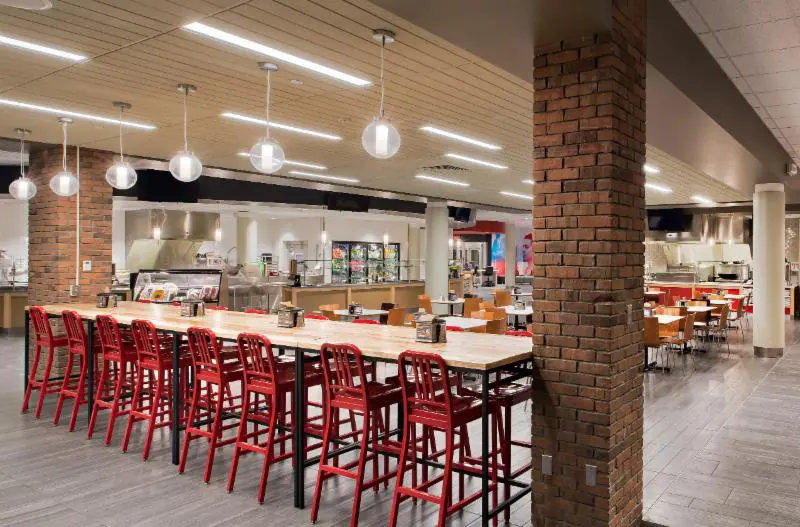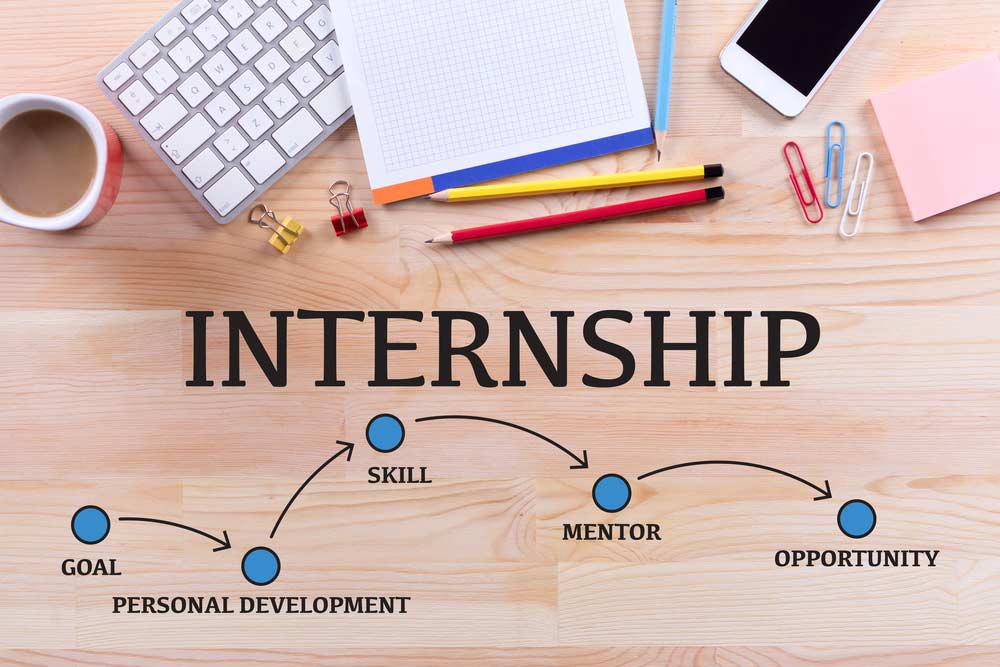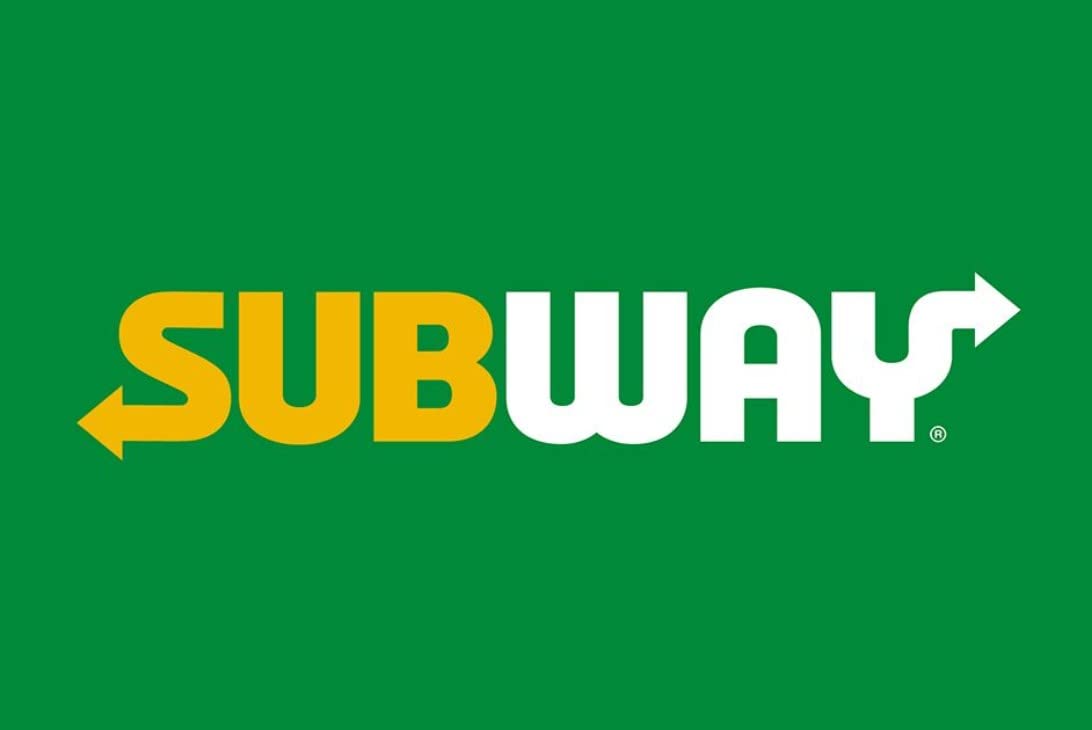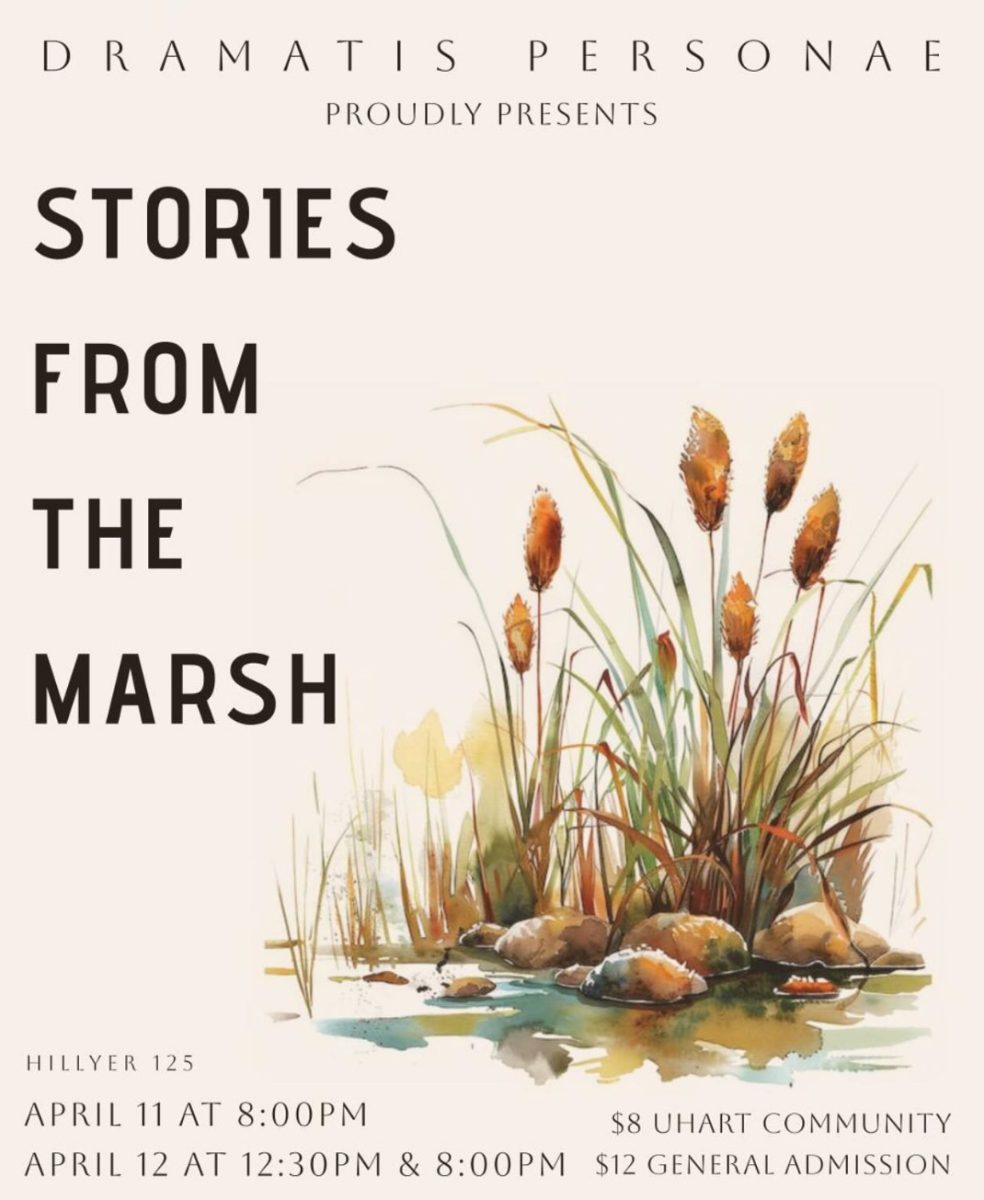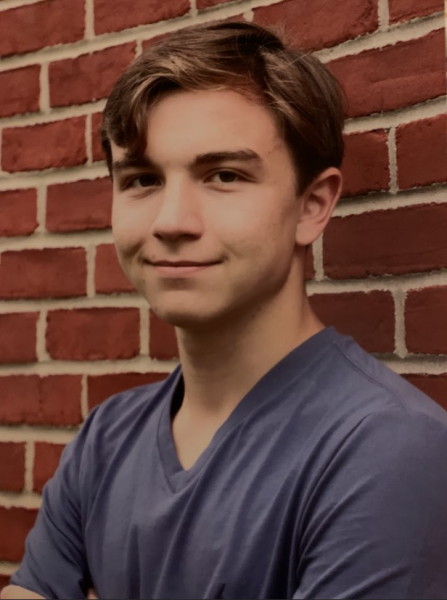The Hartford Informer recently had the privilege of sitting down with Melissa Zavarella, the Executive Chef for UHart Dining Services. Over the course of our interview, we learned about the day-to-day workload of dining service employees, how the organization responds to feedback, dietary protocols, and the culture among UHart Dining Staff members. Everyone at the informer would like to thank Executive Chef Zavarella for her time. The interview is available below.
What does a typical day usually look like at UHart Dining Services, both for yourself and for the employees that you oversee?
“So for me, my position is campus wide, and campus breaks down into retail, resident, dining, and hospitality. So, I oversee culinary for all of those units. So, usually throughout the day, I’m checking in in multiple places. My office is in GSU, and GSU is pretty much obviously our main retail, and that’s where hospitality lives. So usually first, when I come in, I’m checking in with hospitality team, checking in with the retail team, make sure everybody’s good, answer questions. If anyone has questions like, for hospitality, I’ll go up to the board and we’ll review their sheets and events. And if they have questions, concerns, whatever, we kind of work everything out there. Obviously, I always answer my emails in the morning, look at my schedule. We have a lot of meetings and stuff that goes on throughout the day. And then usually, as the day progresses, I ship over to Commons, as Commons is obviously our biggest unit. They pump a lot of food out of here, so usually I’m here through service to help support the culinary team over here. As far as our employees, they pretty much come in and they’re ready to work. The first thing they do is obviously punch in, then they go and get their tablets and they review what they have going on for the day, what their menu is, and go gather their ingredients, get everything prepped and ready to go and execute their meal, and then throughout service they’re kind of just there refreshing, but they’re also prepping and getting things together for the next day.”
Do you typically receive a lot of student feedback on the dining experience, and is it generally constructive?
“We receive a ton of feedback, and we have multiple platforms where we receive it from. So, we have our social media, which I’m sure you guys have seen. We have an Instagram and TikTok. We have an amazing marketing team here. They do polls. They reach out to students. We also employ a ton of students, and we have students we employ on our marketing team, so that’s another source to get opinions and things from. We have a lot of our students that worked for us come in and do secret shoppers to get feedback that way too. We have our voice of the consumer, so if you walk around to the different stations, you’ll see the stickers. It has a QR Code, and you can scan it, and you can give feedback about a station, about an employee, about whatever your dining experience is. And then we also do dining committees. We have our regular dining committee, which meets weekly, and we go through all the areas of campus and we address concerns. We find out what they’re looking for, maybe something they’d want to see next, what did they really like, what can we do more. Yeah. And other than that, you know, we do table touching too, so usually most of our management stays here during service and we go up and we just ask people: how’s your meal? how’s it going? what did you like? And we watch a lot in the dining hall too. Not everything that we do always lands the way we want it to, so we look at the stations. We see where the lines are. Maybe one dish wasn’t as popular, so looking at that. And maybe on the next run, our rotation will make changes. So, we kind of take all of that together and we plan it from there. And we get a lot of constructive feedback. You know, students, I feel like it’s just a different level of eating now. Everyone has Instagram. Everyone is kind of in the loop. Everyone knows what good food is. It’s very different, I feel like, from the dining experience of the past. So, yeah, we take all of the criticism. We take the positive feedback, we take the negative, and we plan with it.”
How much planning would you say typically goes into accommodating students with allergies or other dietary restrictions?
“So, we do a lot of planning with that. We do have a platform where students that have allergies can order their meal. It’s like a smart sheet, and every meal on that smart sheet is top 9 allergen free. It pretty much starts with sourcing your products, making sure that the things we’re offering on this menu are allergen free. They are free from the top 9. They’re safe for students to eat. And then we take those products, and we build menus and recipes into our systems. Then in the kitchen, we have a separate area that has separate cooking utensils–just a whole separate clean area for those meals to be executed from. And then on the university side, usually what happens is a student will touch base with the university and let them know that they have an allergy, and that kind of initiates them working with us. So, usually the first thing we do is we’ll set up a meeting with the student. We like to get to know them, get to know, obviously, what their allergy is, but also they’re eating preferences, you know.
We have some students who will just order off the sheet and so they come in, they order, and they pretty much pick up their meal in a designated time. So, that gives them the ability to still kind of hang out. We’re in the dining hall and students with allergies can eat with their friends, or they can take their meal to go. But we also have a lot of students who live in apartments, and they may have allergies, and we do grocery bags for them, so they can come and pick up some cooked chicken and fresh vegetables and things like that and go and execute their own meal. We check back in with students just to see how it’s going. Maybe we need to make adjustments. Maybe they need to add groceries in, or maybe they’re not utilizing the groceries, and they’re using more of the meals, but you know, it usually revolves around communication and just making sure that everyone is communicating all that. Obviously, the student’s having a good experience, but we also make sure that all of our people who are handling allergy meals are certified . . . Yes, you know, when you’re looking at allergies, it’s such a wide array. Somebody who’s gluten-free may not have the same needs as somebody who’s egg-free or dairy-free. That’s why we try to make a menu that just covers all of that and gives them a bunch of different options. I want them to feel like there’s a variety, that they’re getting a good meal, and getting to eat with their friends and have food they enjoy.”
How would you characterize the atmosphere amongst workers in the dining staff? Would you say there’s a great deal of camaraderie?
“I feel like there is. I feel like we have a very solid team here. I personally have worked at 4 other universities, and I feel like we have one of the best dining teams that I’ve seen of the universities that I’ve worked at. We have people who have been here for 20-30 years, and I feel like you don’t see that nowadays. Most people go somewhere and they’re there for a year or two, and they move on. We have people who’ve been here 35 plus years, and I definitely feel like there’s something to say when you have that. We have students that have worked here and are now salaried managers because they chose to stay after graduation. I think our marketing manager was a student here and she’s a salary manager now. So, I feel like it’s a good atmosphere. I feel like we’re always looking at what’s next, trying to have fun, trying to keep up with trends and things like that—to make it a fun place to work and make it like a team atmosphere.”
What would you say are some of the biggest challenges of managing such a large food service on campus?
“I would say some of the biggest challenges that we have are probably just facing the day-to-day regular challenges and making sure that none of that is seen by the guests. There are things that are always going to go wrong: people are going to call out, food’s not going to show up, we’re going to get shorted, someone’s going to have to change the menu. Maybe we did something and it just didn’t land the way that we wanted it to or wasn’t as popular as we thought it was going to be. It’s not necessarily just the challenges to me. I feel like it’s always the way that you handle the challenges so that your customers aren’t affected. And the other thing that I think is challenging, like I was saying earlier, is everyone has Instagram, everyone’s on TikTok, everyone’s seeing food reviews, and I think we live in a world of a more educated consumer. We have people who know what good food is. People like an authentic experience. Food is all about the experience. You can’t just put out chicken nuggets anymore. We do smash burgers on Fridays. Although people love the chicken nuggets because we get really good chicken nuggets, but, you know, we’re doing smash burgers on Fridays and throwing cheese sauce out on the grill. So, you know, I feel like it’s just keeping up with change and keeping our guests happy.”
On the opposite side of the spectrum, what would you say are the most enjoyable parts of your job?
“I would say doing the events that we put on and the people. The people you meet, the conversations you have, the food experiences that you create, to me is the best part. Getting to do something new, getting to try something new, and having this receptive audience that wants to try these things, that are not afraid to be like, you know I’ve never had that, but Hey, it’s here, I’m going to try it. Yesterday, we did summer rolls in the dining hall, and it was fun, and we had students come up, and they were just like, “I have always wanted to do this,” and “I’ve never had this before.” And they got to come up, and they got to roll their own summer rolls and choose their dips and their toppings. I think the best part of this job is just creating those experiences and having people around you that want to be a part of it, you know.”
Do you mind telling us what your personal journey has been to get here?
“I went to a local culinary school in Connecticut. They no longer exist. It was one of the Lincoln Tech School’s centers for culinary arts, and I did a 2-year culinary program. I actually started out my career in hotels, and I was in hotels for about 9 years before getting into universities. I actually took my first executive chef position in a Connecticut university, and I feel like once you get into universities, you never leave. It’s just, it’s a whole different lifestyle. It’s fun. You get to do cool things. You get to do trendy things, but it also gives you a really great work-life balance. You know, when I worked in hotels, I pretty much worked every holiday. You work, you’re open all the time, you never close. And here, you get those breaks in between where you get to recharge, plan, and come up with the next fun thing to try. So, once you get into universities, you never leave.
In some of my visits, when I have gone back to the CIA and done things, I always tell students because everyone’s very gung-ho, they’re like, “restaurants restaurants,” and I’m like, do it for a couple of years. Then get over to a university or maybe do a little business dining or something. When I came to the University of Hartford, I was actually the catering director for 3 years, so I got out of culinary for a few years—up until that point I had been a sous chef for about 7-8 years—and then I took my first executive chef position about 15 years ago. I’m the first female executive chef that the university has ever had. And when I took over the position, I was one of the only female executive chefs running an account in the Northeast for the company, and since then I believe we have 4 or 5 more running accounts.
But yeah, I love it here, and I’ve had so many amazing opportunities. I’ve gotten to go to the CIA and do Pro Chef 2, Pro Chef 3. I’m the only person in the history of the program who has done both of them in less than a year. It’s a really fun program, you’re there for like two weeks, and you get to work with really dope chefs. Half of it is actual written testing, and for the other half you’re in the kitchen testing. They watch you and judge you like Gordon Ramsay in there. They’re not very nice, but, you know, you just say, “thank you, chef,” and you keep it moving. I’ve gotten to do culinary competitions. We actually hosted one here last year. I’ve gotten to do a bunch of travelling and see some really cool things and go visit other accounts. I just love food. I’m passionate about food, and I love being here because I just feel like I have the ability to take that and kind of run with it here, and you don’t always have that. You don’t always have a supportive team that’s like, yeah, you know, that’s a good idea, let’s try it out, and we have that here. Thank you.”
